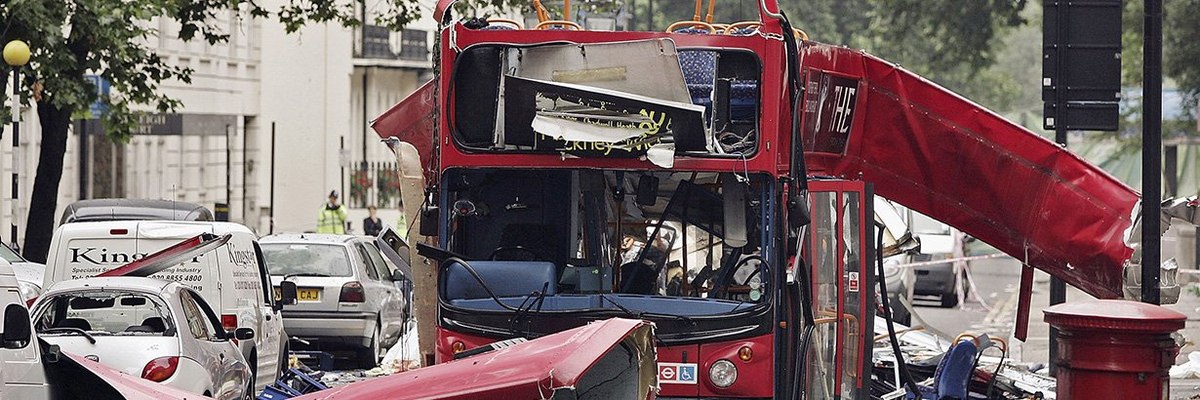Where the Conservatives were generally seen to be handling terrorism well, the public are divided on Labour
With next week marking twenty years since the 7/7 terror attacks in London, new YouGov data examines public concerns around terrorism and how opinion has changed in the years since the bombings.
Terrorism fears have been rising
Concern about the threat of terrorism has been growing in Britain over the last couple of years. Where in mid-2023 only 14% of Britons felt the threat had increased “a lot” over the preceding five years, that figure has steadily increased each wave and has now doubled to 29% as of June.
Combined with the number of Britons who think the threat of terrorism has increased “a little”, this means the total number who think we are increasingly at risk has increased from 38% to 54% in two years.
By contrast, our polling at the time of the fifth anniversary of the 7/7 bombings found only 25% thinking the threat of terrorism had increased over the past five years – although this might reflect more that the public considered the threat had remained consistently high (see below).
There has likewise been a similar increase in the number of people who think terror attacks on British cities and targets are very likely. One in three members (32%) of the public now think so, up from 20% in January 2024.
Overall, 74% of Britons think that the odds of terror attacks on the UK are very or fairly likely, a combined tally that has been at about the same level for the past five years, and also close to the 76% it was in 2010, at the time of the fifth anniversary of the 7/7 attacks. In the immediate aftermath of the bombings, 92% of Britons had thought further atrocities were likely.
Nevertheless, few Britons (12%) believe there is a high chance that themselves or their loved ones will be killed or hurt in a terrorist attack, a figure which – in contrast to the other questions – has increased only marginally over the last couple of years. This rate is slightly higher now than in 2010 (7%), and compares to 16% in 2005, in polling days after the attacks themselves.
Where do Britons think the threat comes from?
The 7/7 attacks were carried out by Islamic extremists, and YouGov tracking data that reaches back to 2021 shows that this is still the group the public consider to be the biggest threat to the UK.
Almost half of Britons (47%) consider Islamic extremists to be a “big threat” to Britain, a figure which rises to three quarters (75%) if you include those who see them as a “moderate threat”.
This compares to 25% who see right-wing extremists as a big threat to Britain; 12% who say the same of left-wing extremists; and 6% of Irish Republican extremists.
In all cases, this represents the lowest figure since we started asking in 2021.
Perceptions of the Labour government’s handling of terrorism are more negative than their Conservative predecessors’
Of the policy areas on which we track government performance, in recent history ‘terrorism’ has been the one on which governments have received an unequivocally good score, with a healthy lead for ‘doing well’ over ‘doing badly’, even while floundering on other areas.
However, that trend came to a halt in the summer of last year. This is a result of two factors. First was the change in government. While immediately following the election belief the government is doing well on terror fell sharply, so too did the perception that they were doing badly – hardly surprising, given Keir Starmer had only just taken office. At this point, the government still experienced a typically larger number of people saying they were doing a good rather than bad job managing the issue.
Second appears to have been the Southport stabbings. Between two polls in late July and mid-August last year, the number of people saying the government had performed poorly on terrorism shot up from 24% to 35%. It has stayed at similar levels since then, with the exception of a period at the beginning of this year following Axel Rudakubana’s sentencing, when it shot up 13pts to 45%.
Outside of that period, the public have been near-evenly divided on the government’s handling of terrorism – a far cry from previous years.
Latest results on threats from extremist groups here
Other data derived from the following YouGov website trackers
- How the government is handling the issue of terrorism in the UK
- Likelihood of further terrorist attacks on British cities and targets
- Do Brits think someone they know is likely to be wounded or killed by a terrorist attack?
- Has the threat of terrorism increased in the last 5 years?
Photo: Getty
How do you feel about the government's handling of terrorism, the level of threat the UK faces, and everything else? Have your say, join the YouGov panel, and get paid to share your thoughts. Sign up here.










